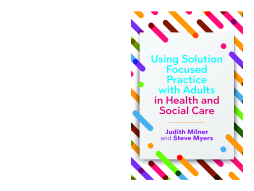
BOOK
Using Solution Focused Practice with Adults in Health and Social Care
(2017)
Additional Information
Book Details
Abstract
Solution focused practice offers proven ways of helping adults overcome a range of life difficulties, from physical and mental illness to learning disability and the challenges of old age.
This book outlines the basic principles and techniques which can be used to identify people's strengths and abilities to overcome challenges, make their own decisions and achieve their goals. Using case examples of life challenges at every stage of adulthood, including problematic behaviours, trauma, loss and end of life care, it provides stimulating activities and questions that will help professionals develop constructive conversations with service users and help them find the solutions they need.
This comprehensive guide is an essential introduction for all those working with adults in health and social care.
Judith Milner, a former therapist and senior lecturer in social work, is a widely published author on solution focused practice. Steve Myers is Director of Social Sciences at University of Salford, Manchester.
The language the authors use is exemplary: loud and clear, no nonsense. I particularly like the reflective parts, with the kinds of questions a solution focused worker would ask their client. A book you should have in your library!
Els Mattelin, therapist and co-author of Autism and Solution-focused Practice
The practice activities in the book provide a wide range of questions we can use to ensure that clients feel they are being heard properly. It is an accessible book, which will be of use to anyone involved in multi-agency working.
Kidge Burns, Solution focused practitioner, trainer and author of Focus on Solutions: A Health Professional’s Guide
Table of Contents
| Section Title | Page | Action | Price |
|---|---|---|---|
| Using Solution Focused Practice with Adults in Health andSocial Care, by Judith Milner and Steve Myers | 3 | ||
| 1. Useful Conversations - Positive Approaches to Working with Adults | 9 | ||
| 2. Taking People Seriously | 32 | ||
| 3. Setting Achievable Goals | 60 | ||
| 4. Finding Exceptions to Problems | 99 | ||
| 5. Discovering People’s Strengths | 121 | ||
| 6. Scaling Goals, Progress and Safety | 137 | ||
| 7. Bringing It All Together | 162 | ||
| References | 181 | ||
| Subject Index | 188 | ||
| Author Index | 191 |
